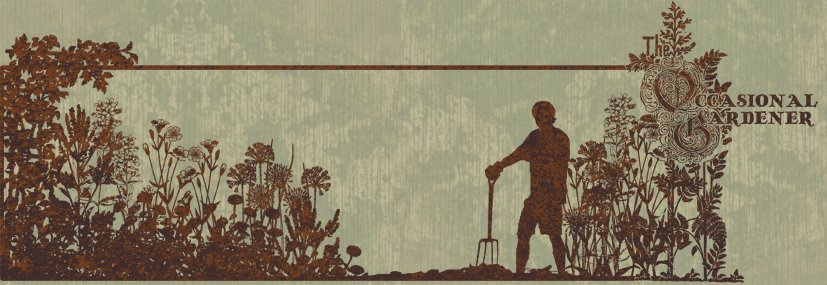By H H Munro "Saki"
"Don't talk to me about town gardens," said Elinor Rapsley; "which means, of course, that I want you to listen to me for an hour or so while I talk about nothing else. 'What a nice-sized garden you've got,' people said to us when we first moved here. What I suppose they meant to say was what a nice-sized site for a garden we'd got. As a matter of fact, the size is all against it; it's too large to be ignored altogether and treated as a yard, and it's too small to keep giraffes in. You see, if we could keep giraffes or reindeer or some other species of browsing animal there we could explain the general absence of vegetation by a reference to the fauna of the garden: 'You can't have wapiti and Darwin tulips, you know, so we didn't put down any bulbs last year.' As it is, we haven't got the wapiti, and the Darwin tulips haven't survived the fact that most of the cats of the neighbourhood hold a parliament in the centre of the tulip bed; that rather forlorn looking strip that we intended to be a border of alternating geranium and spiraea has been utilised by the cat-parliament as a division lobby. Snap divisions seem to have been rather frequent of late, far more frequent than the geranium blooms are likely to be. I shouldn't object so much to ordinary cats, but I do complain of having a congress of vegetarian cats in my garden; they must be vegetarians, my dear, because, whatever ravages they may commit among the sweet pea seedlings, they never seem to touch the sparrows; there are always just as many adult sparrows in the garden on Saturday as there were on Monday, not to mention newly-fledged additions. There seems to have been an irreconcilable difference of opinion between sparrows and Providence since the beginning of time as to whether a crocus looks best standing upright with its roots in the earth or in a recumbent posture with its stem neatly severed; the sparrows always have the last word in the matter, at least in our garden they do. I fancy that Providence must have originally intended to bring in an amending Act, or whatever it's called, providing either for a less destructive sparrow or a more indestructible crocus. The one consoling point about our garden is that it's not visible from the drawing-room or the smoking-room, so unless people are dinning or lunching with us they can't spy out the nakedness of the land. That is why I am so furious with Gwenda Pottingdon, who has practically forced herself on me for lunch on Wednesday next; she heard me offer the Paulcote girl lunch if she was up shopping on that day, and, of course, she asked if she might come too. She is only coming to gloat over my bedraggled and flowerless borders and to sing the praises of her own detestably over-cultivated garden. I'm sick of being told that it's the envy of the neighbourhood; it's like everything else that belongs to her -- her car, her dinner-parties, even her headaches, they are all superlative; no one else ever had anything like them. When her eldest child was confirmed it was such a sensational event, according to her account of it, that one almost expected questions to be asked about it in the House of Commons, and now she's coming on purpose to stare at my few miserable pansies and the gaps in my sweet-pea border, and to give me a glowing, fulllength description of the rare and sumptuous blooms in her rose- garden."
"My dear Elinor," said the Baroness, "you would save yourself all this heart- burning and a lot of gardener's bills, not to mention sparrow anxieties, simply by paying an annual subscription to the O.O.S.A."
"Never heard of it," said Elinor; "what is it?"
"The Occasional-Oasis Supply Association," said the Baroness; "it exists to meet cases exactly like yours, cases of backyards that are of no practical use for gardening purposes, but are required to blossom into decorative scenic backgrounds at stated intervals, when a luncheon or dinner-party is contemplated. Supposing, for instance, you have people coming to lunch at one- thirty; you just ring up the Association at about ten o'clock the same morning, and say 'lunch garden'. That is all the trouble you have to take. By twelve forty-five your yard is carpeted with a strip of velvety turf, with a hedge of lilac or red may, or whatever happens to be in season, as a background, one or two cherry trees in blossom, and clumps of heavily-flowered rhododendrons filling in the odd corners; in the foreground you have a blaze of carnations or Shirley poppies, or tiger lilies in full bloom. As soon as the lunch is over and your guests have departed the garden departs also, and all the cats in Christendom can sit in council in your yard without causing you a moment's anxiety. If you have a bishop or an antiquary or something of that sort coming to lunch you just mention the fact when you are ordering the garden, and you get an old-world pleasaunce, with clipped yew hedges and a sun-dial and hollyhocks, and perhaps a mulberry tree, and borders of sweet-williams and Canterbury bells, and an old-fashioned beehive or two tucked away in a corner. Those are the ordinary lines of supply that the Oasis Association undertakes, but by paying a few guineas a year extra you are entitled to its emergency E.O.N. service."
"What on earth is an E.O.N. service?"
"It's just a conventional signal to indicate special cases like the incursion of Gwenda Pottingdon. It means you've got some one coming to lunch or dinner whose garden is alleged to be 'the envy of the neighbourhood.'"
"Yes," exclaimed Elinor, with some excitement, "and what happens then?"
"Something that sounds like a miracle out of the Arabian Nights. Your backyard becomes voluptuous with pomegranate and almond trees, lemon groves, and hedges of flowering cactus, dazzling banks of azaleas, marble-basined fountains, in which chestnut-and-white pondherons step daintily amid exotic water-lilies, while golden pheasants strut about on alabaster terraces. The whole effect rather suggests the idea that Providence and Norman Wilkinson have dropped mutual jealousies and collaborated to produce a background for an open-air Russian Ballet; in point of fact, it is merely the background to your luncheon party. If there is any kick left in Gwenda Pottingdon, or whoever your E.O.N. guest of the moment may be, just mention carelessly that your climbing putella is the only one in England, since the one at Chatsworth died last winter. There isn't such a thing as a climbing putella, but Gwenda Pottingdon and her kind don't usually know one flower from another without prompting."
"Quick," said Elinor, "the address of the Association."
Gwenda Pottingdon did not enjoy her lunch. It was a simple yet elegant meal, excellently cooked and daintily served, but the piquant sauce of her own conversation was notably lacking. She had prepared a long succession of eulogistic comments on the wonders of her town garden, with its unrivalled effects of horticultural magnificence, and, behold, her theme was shut in on every side by the luxuriant hedge of Siberian berberis that formed a glowing background to Elinor's bewildering fragment of fairyland. The pomegranate and lemon trees, the terraced fountain, where golden carp slithered and wriggled amid the roots of gorgeous-hued irises, the banked masses of exotic blooms, the pagoda-like enclosure, where Japanese sand-badgers disported themselves, all these contributed to take away Gwenda's appetite and moderate her desire to talk about gardening matters.
"I can't say I admire the climbing putella," she observed shortly, "and anyway it's not the only one of its kind in England; I happen to know of one in Hampshire. How gardening is going out of fashion; I suppose people haven't the time for it nowadays."
Altogether it was quite one of Elinor's most successful luncheon parties.
It was distinctly an unforeseen catastrophe that Gwenda should have burst in on the household four days later at lunch-time and made her way unbidden into the dining-room.
"I thought I must tell you that my Elaine has had a water-colour sketch accepted by the Latent Talent Art Guild; it's to be exhibited at their summer exhibition at the Hackney Gallery. It will be the sensation of the moment in the art world -- Hullo, what on earth has happened to your garden? It's not there!"
"Suffragettes," said Elinor promptly; "didn't you hear about it? They broke in and made hay of the whole thing in about ten minutes. I was so heart-broken at the havoc that I had the whole place cleared out; I shall have it laid out again on rather more elaborate lines."
"That," she said to the Baroness afterwards "is what I call having an emergency brain."






